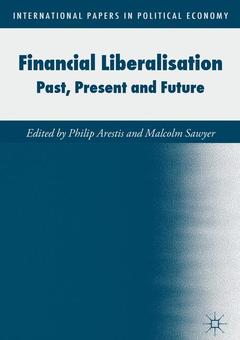Description
Financial Liberalisation, 1st ed. 2016
Past, Present and Future
International Papers in Political Economy Series
Language: English
Subjects for Financial Liberalisation:
Financial Liberalisation
Publication date: 12-2016
Support: Print on demand
Publication date: 12-2016
Support: Print on demand
Financial Liberalisation
Publication date: 07-2018
Support: Print on demand
Publication date: 07-2018
Support: Print on demand
Description
/li>Contents
/li>Biography
/li>Comment
/li>
This book is the thirteenth volume in the International Papers in Political Economy (IPPE) series which explores the latest developments in political economy. A collection of eight papers, the book concentrates on the deregulation of domestic financial markets and discusses financial liberalisation in terms of its past performance, current progress and future developments. The chapters have been written by expert contributors in the field and focus on topics such as past records of financial liberalisation, future policies of regulation, and current account imbalances. Other papers examine capital account regulations in developing and emerging countries, and capital controls in the Eurozone after the 2007 financial crisis. This collection of papers invites readers to consider the impact of financial liberalisation both during and after the global economic crisis. Scholars and students with an interest in political economy, financialisation, and economic performance will find this collection stimulating and informative.
1. Financial Liberalisation, the Finance-Growth Nexus, Financial Crises and Policy Implications; Philip Arestis.- 2. Confronting Financialisation; Malcolm Sawyer.- 3. Financialisation and Financial Balance Sheets of Economic Sectors in the Euro Area; Jesús Ferreiro and Carmen Gómez.- 4. Achieving Financial Stability and Growth in Africa; Stephany Griffith-Jones.- 5. Capital Controls in a Time of Crisis; Ilene Grabel.- 6. Capital Controls and the Icelandic Banking Collapse: A Reassessment; John McCombie and Marta Spreafico.- 7. Stemming the Tide: Capital Account Regulations in Developing and Emerging Countries; Annina Kaltenbrunner.- 8. Financial Regulation and the Current Account; Sergi Lanau and Tomasz Wieladek.
Philip Arestis is Professor and Director of Research at the Cambridge Centre for Economics and Public Policy, Department of Land Economy, University of Cambridge, UK, and Professor at the Department of Applied Economics, University of the Basque Country, Spain. He is also Distinguished Adjunct Professor of Economics at the University of Utah, USA, and Research Associate at the Levy Economics Institute, USA. He previously served as Chief Academic (External) Adviser to the UK Government Economic Service (GES) on Professional Development in Economics. He is holder of the Queen Victoria Eugenia award of the British Hispanic Chair of Doctoral Studies, and was awarded homage by the Brazilian Keynesian Association (AKB) for his contribution to the spread of Keynesianism in Brazil. He has published a number of books and papers in academic journals.
Malcolm Sawyer is Emeritus Professor of Economics at Leeds University Business School, University of Leeds, UK. He is the principal investigator for the five-year, 15-partner project Financialisation, Economy, Society and Sustainable Development, funded by the European Commission Framework Programme 7. He is Managing Editor of the International Review of Applied Economics, on the editorial board of a range of journals, and editor of the New Directions in Modern Economics series. He has published widely in the areas of post-Keynesian and Kaleckian economics, financialisation, fiscal policy, money, industrial economics, and on UK and European economies.
Examines the impact of financial liberalisation on economies around the world following the global economic crisis
Provides insight into how the deregulation of domestic financial markets has impacted economic performance
Contains contributions from leading scholars and experts in financial regulation and policy
© 2024 LAVOISIER S.A.S.




